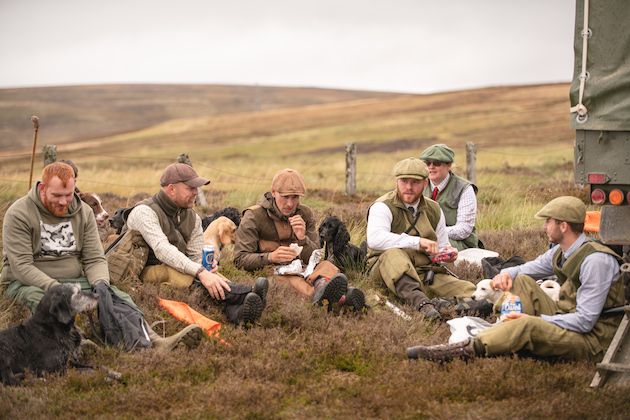Beaters are a key part of a shoot and need to follow some important guidelines
Want to be an ideal beater? Correct beating on a shoot day is crucial to its success.
What does a beater actually do?
Beaters are there to flush out the birds into the path of the Guns. Which sounds simple, but there’s a lot more involved in it than that. A beater is an important part of the whole team and part of the management of the whole day. The beating line needs to move at the right pace, allowing the Guns time to get ready. (Read our piece on what beaters know and Guns should.)
And then there are the dogs in the beating line.
To provide a useful checklist we asked some seasoned shoot managers for some tips and advice. Essential reading for those beaters out for a first season or with only a few previous outings under their belts. (Wondering what to wear on a beating day – read our list of the best clothing for beaters.)
As Mike Applyby of the Honeycombe shoot commented: “Nothing makes my job easier than a good team of reliable beaters and picker-ups.”

Bring your own stick or flag – some shoots provide them while some will not
Beating on a shoot day
- Follow the directions you are given and don’t decide that you know better than the gamekeeper or shoot captain. If they ask you to do something new on a shoot you should never reply: “The last keeper here never did it like this” or “we don’t normally do it that way.” The gamekeeper is the captain and beaters need to follow directions if they are to play a useful role. Otherwise you may as well go home.
- Listen carefully to the shoot briefing and obey instructions. Most keepers use radio-men in the line to pass on guidance which should be followed precisely. Sometimes the information will need passing quickly, clearly and quietly from one beater to the next.
- Make sure you have your own stick or flag. Some shoots provide them, others don’t.
- Some beaters seem to find walking in a straight line difficult. It isn’t. Just keeping looking to left and then right and you’ll be there…
- When it comes to high maize crops ask your next-door neighbours where they are and adjust your position accordingly.
- Use your stick to beat a path through brambles – don’t walk around them.
- Do whatever job you are asked. Which might be going on stop, carrying game back to the game cart or standing with a novice Gun, if you’re experienced. A good beater will be flexible.
- Be prepared to be asked to hang game in the larder or open and close farm gates.
- Make sure you arrive promptly and don’t be offended if the keeper, who sounded pleasant on the phone, appears a bit gruff. Keepers have a lot on their mind on a shoot day and exchanging pleasantries when they have 100 things to think about is the last thing they need.
- Be reliable. If you’re not, you won’t be asked again.
- Wondering if beaters get paid enough?
- Let the gamekeeper know weeks in advance which shoots you can make, and those you can’t. This gives him (or her) time to find a replacement.
- Even if you think your gundog is beautifully trained don’t just turn up with him without asking. If a keeper stipulates ‘no dogs in the beating line’ it’s generally because he doesn’t require dogs for the drives he is doing. A badly trained dog can easily ruin a drive (or entire day for that matter!) but once a keeper can see that you understand how his day works he may be more willing to let you bring your dog at a future date.
- Do not assume your dog will be welcome on every shoot!
- Your goal should be to prove that you are a valuable, reliable member of the beating team.
- Wear the right clothes for the day’s weather. Check the forecast. Layers are good. You can always take a layer off if you’re too warm. (See here for advice on the best boots for shooting and the best waterproof jackets.)
- Gaiters are a good choice for beaters and will keep your lower legs protected from brambles.
- The shoot may not provide lunch so check in advance and bring a packed lunch if necessary.
- If you’re unfamiliar with the ground, ask if you can go on a reconnaissance, in particular on new drives.
- If you’re using radios don’t make long-winded observations. Keep messages simple and short.
- Be prepared to help everyone else. If you see a picker-up with 25 birds hanging off their shoulders offer to carry them to the gamecart if you have time. Then the picker-up can carry on with some more retrieving.
- Take note of what is going on when beating. You might see birds leaking out of an area that you can report back to the keeper.
- If you are offered game then take it and cook it. (You’ll find some excellent pheasant recipes here.)
- If you’re wondering about the tax implications of getting money for beating read this useful article.)
- Remember that the keeper will have eyes in the back of his head and sees everything!

Dogs are by invitation only and should be well-trained
This piece was originally published in 2014 and has been updated.






